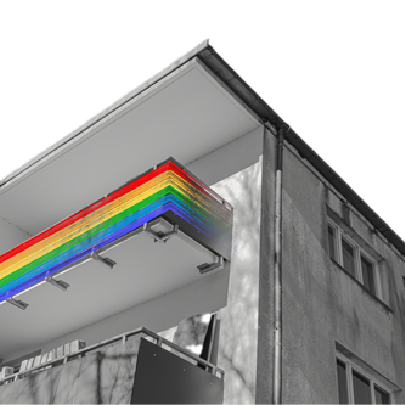
The catastrophic situation in the housing market has long been known to most. Finding any kind of housing is already challenging for anyone, regardless of their background and social status. However, for the people in the migrant community, the difficulty raises tenfold and finding a place of your own becomes almost impossible. Especially if you are a refugee and/or queer.
Fortunately, in Berlin, there are various organisations and projects that are doing their best to alleviate this difficult task for particularly vulnerable groups of citizens. One of these projects was run by Quarteera, a queer organisation for migrants. As part of this project, in the span of two years, 42 people were able to obtain long-term residence in individual rooms in Kreuzberg.
At the end of March, this project came to an end, and all the residents of the hostel had to look for other accommodation. We decided to talk to several people from the dorms to learn more about their stories, their thoughts, their hopes, and their fears. Four completely different queer* people, four distinct stories that will allow you to get to know the struggles of queer* people better.
Dmytro
Due to all the horrors happening in the world lately, the number of refugees in Germany has only increased. Berlin has long been unable to meet the needs for the accommodation of those in need, which is why queer individuals, who belong to particularly vulnerable categories of refugees and require special protection, cannot feel safe in refugee centres and similar places.
Often, newly arrived people have to deal with this problem on their own, which frequently makes them victims of violence or forces them to endure inadequate conditions in the places where they manage to find shelter. For example, Dmytro (21) from Ukraine faced similar situations twice during his refugee journey:
“I left Ukraine at 19 due to the war and moved to Poland in hopes of earning some money and then going to England to my aunt. But soon I realised that it wasn’t a viable option.
I had worked for 7 months in a warehouse and during that time lived in a hostel where my roommate had stolen my personal belongings and disappeared. Then, I met a guy who didn’t mind helping me move to Berlin and letting me stay with him for a while.
I agreed, we moved, and that’s how I ended up in Berlin. At first, everything was fine. Then a rather unpleasant situation led to me not having a roof over my head. I had just come back from language school; it was the second day of classes. I was in a wonderful mood. We sat down to dinner.
My neighbour was drunk. Then we had a conflict during which he tried to strangle me and just threw me into the stairway outside the flat. After that, I had to call the police. I could never return to that flat again.”
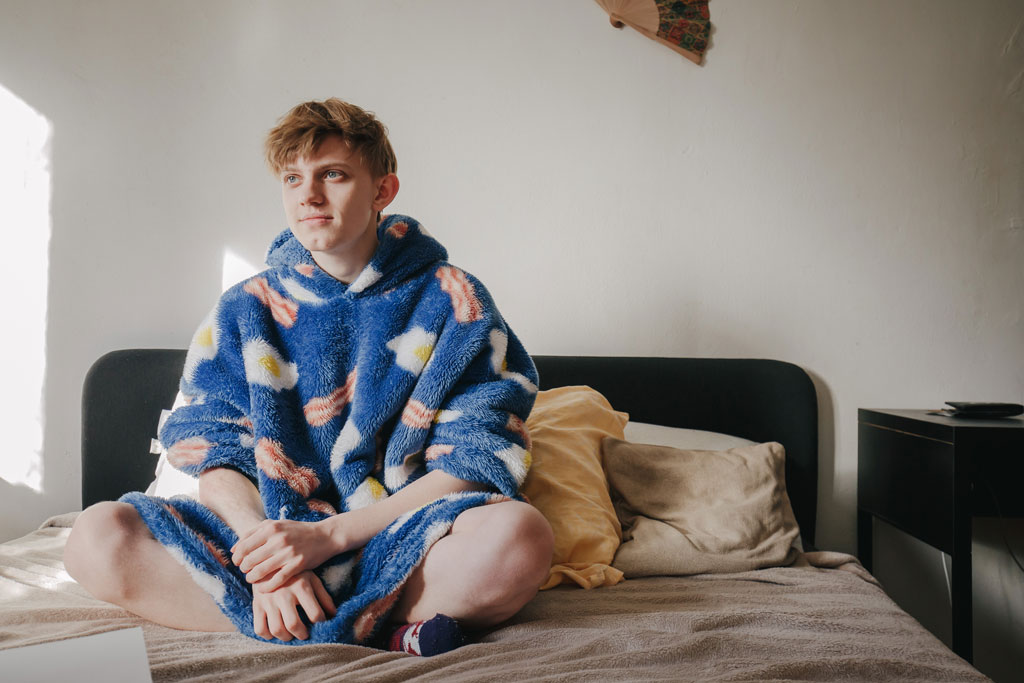
Gregory Sky
Unfortunately, such stories are not uncommon among queer* refugees. Many of them do not speak out due to the fear of losing their accommodation and ending up in a hostile environment in a collective living space. Even more common are situations where landlords demand sexual services from queer* refugees in exchange for the opportunity to live in their flat, blackmailing them with the threat of ending up on the street with no one to help them.
A similar situation happened, for example, to Gregory Sky (33), a refugee from Donetsk, Ukraine. “I arrived in Berlin at the beginning of the war, in March, together with my partner. We were together here for six months. Then conflicts started, and the relationship became very toxic, which led to us making the decision to part ways. Unfortunately, we were tied to the flat because we had arrived together and first lived in the same Heim, and then we were moved into a flat with other queer people from Ukraine.
By that point, the relationship had become unbearable. I decided to leave, but I had nowhere to go. By chance, I found a blind 70-year-old German gay man through some other organisation. I left my boyfriend and lived with this old man in Schöneberg for three months. The man needed someone to care for him, like a grandchild or a friend, and I agreed to be his caretaker in exchange for him giving me a place to live. I would also perform basic chores like cleaning and such, and would help the man go out for walks, help him use the bathroom. This arrangement lasted for about three months because the vibes were mad off. The man would routinely suggest we ‘make love’. He then started courting me, gifted me dog masks, sex toys. Some of them I still have. However, it wasn’t my cup of tea. And I realised that I could no longer stay with this man.”
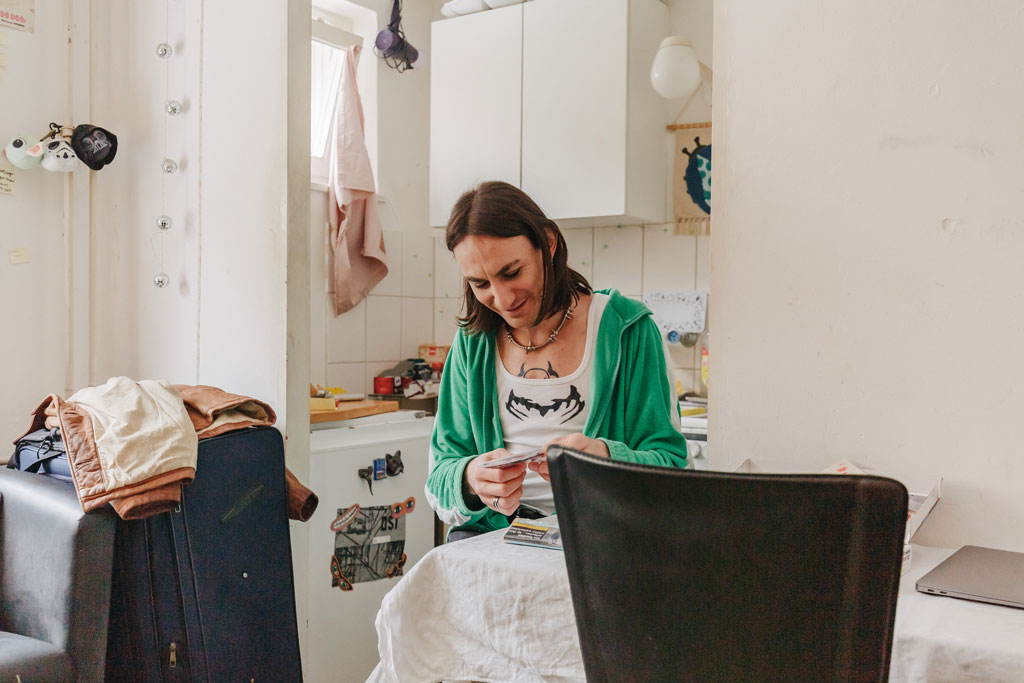
Vlad
Unfortunately, many victims of this type of violence do not speak about it. The fear of ending up on the streets or returning to a refugee dormitory, where queer people often become victims of bullying and even attacks, is too great. Practically every queer* refugee can tell a similar story about their neighbours in the refugee camp, for example, Vlad (29) from Russia:
“I flew to Berlin and at first lived in Frohnau with my ex-boyfriend. Then I lived in a rented flat that I booked through Airbnb, and later with acquaintances. At the start, I tried to gather documents for a freelancer visa. Nothing worked out, and I had to apply for asylum. As an asylum seeker, I ended up at the Karl-Bonhoeffer-Nervenklinik arrival centre. Initially, I slept on army cots in an old hospital building with an inner courtyard where people threw away leftover food. My windows faced directly onto that rubbish.
A plant was growing in our sink, it was that dirty. I lived like that for about two months. Then I had to spend three weeks in the hospital. After that, I was transferred to another building of the same arrival centre. It was terrible there. Eventually I started getting threats from other Russian-speaking refugees. One was from Moldova, and he had friends there. They started stalking me, extorting money, and then threatening physical harm. “I’m just reminding you that the doors here don’t lock at night,” he said. And indeed, in this accommodation, the doors did not close at night: anyone could come in and do whatever they wanted. In the end, I found myself on the streets.
For two days, I was literally homeless. These two days I stood in line at LAF to explain that I essentially had nowhere to go. Later, I finally got a place in a queer housing project. Of course, interpersonal conflicts are inevitable when so many completely different people live in one space — this happens in queer housing as well. But when you are surrounded by people like you, who have gone through similar experiences and belong to the same community, there is at least a basic sense of safety — and it is simply easier to live with this.”
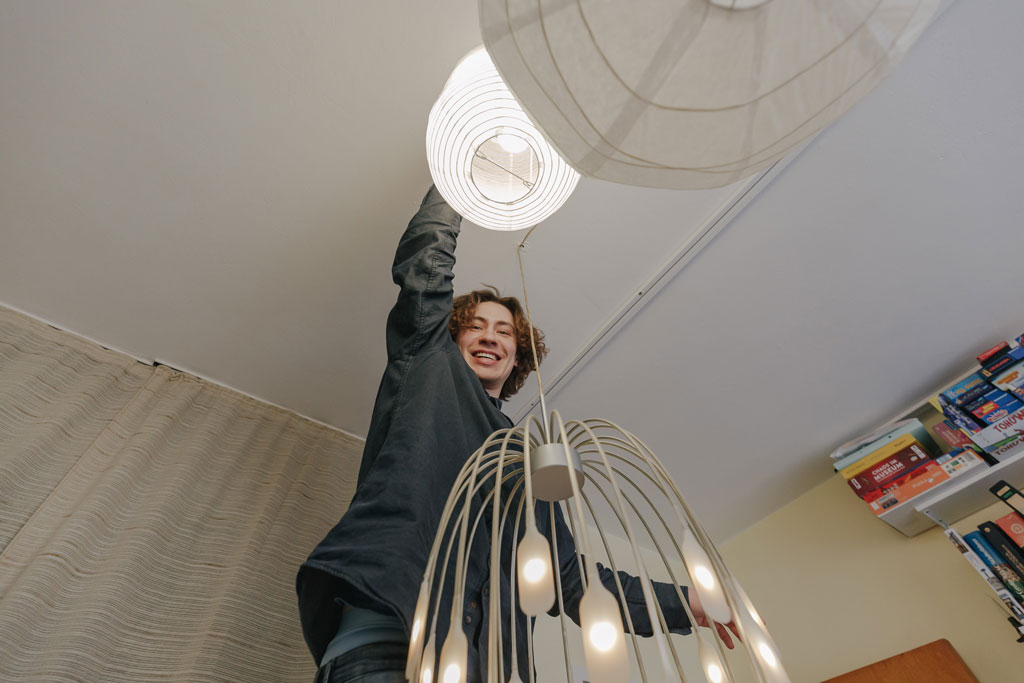
Kanykey
It is especially difficult for trans* individuals, who are most at risk in refugee shelters. This is what another of our heroines, Kanikei (32), a trans* activist and refugee from Kyrgyzstan, says: “Quarteera’s dormitory was my fourth home.
Before that, I moved several times: from the initial shelter to another accommodation, then from there to a third one. There, I faced bullying and threats from the neighbours.
We had a shared toilet, shower, and kitchen. Every time I had to use these shared facilities, I, as a trans*woman, felt very uncomfortable and even unsafe. There were even instances when a man would sexually harass me. It was terrible to be there every day and just go about my daily routine.”
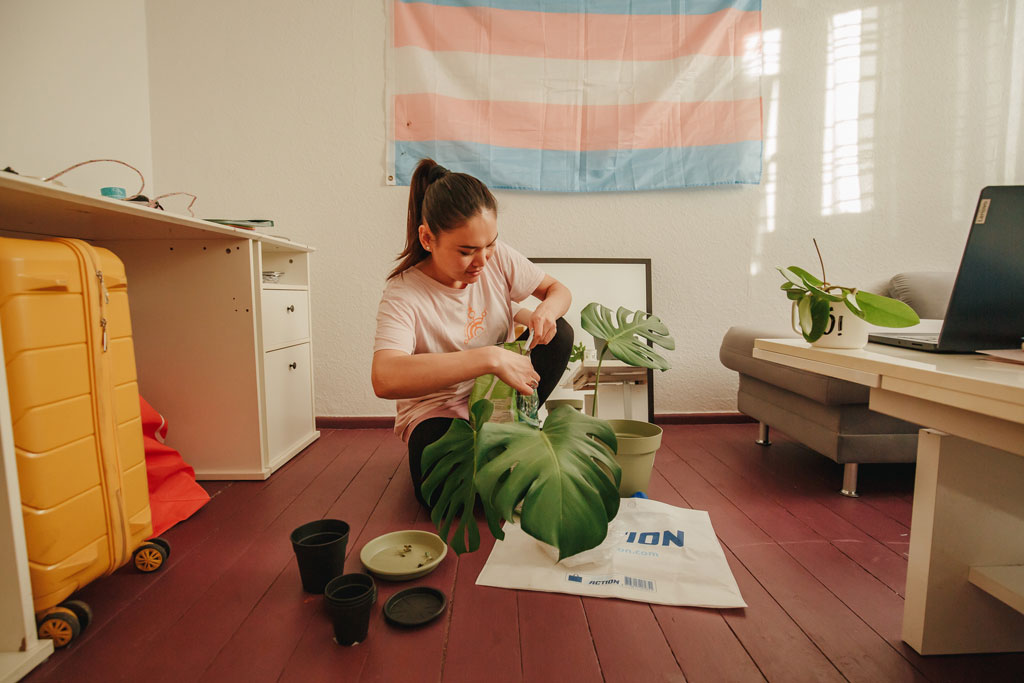
A sense of safety is the most important thing that queer refugees need. That’s why they are so afraid to live in refugee dormitories and reception centres. When a person isn’t granted a basic sense of safety, they cannot begin to work on building a life in a new country – their new home – and therefore cannot successfully integrate into the new society.
“Of course, I was very happy to have the opportunity to live alone. After all, before that, I had gone through the asylum-seeking process, and that was really difficult. In the process of seeking asylum, you first end up in a dormitory with a lot of strangers in one place, no personal space. You have to find a way adapt.
Everything is different here. I created my own cosy home. I could furnish my room however I wanted. Of course, there were different experiences, different neighbours. Sometimes it was noisy, and sometimes I felt like there was no proper control. But overall, I felt safe and calm because there were Russian-speaking LGBTQ+ people living there. It was much easier to live side by side with them,” says Kanakei.
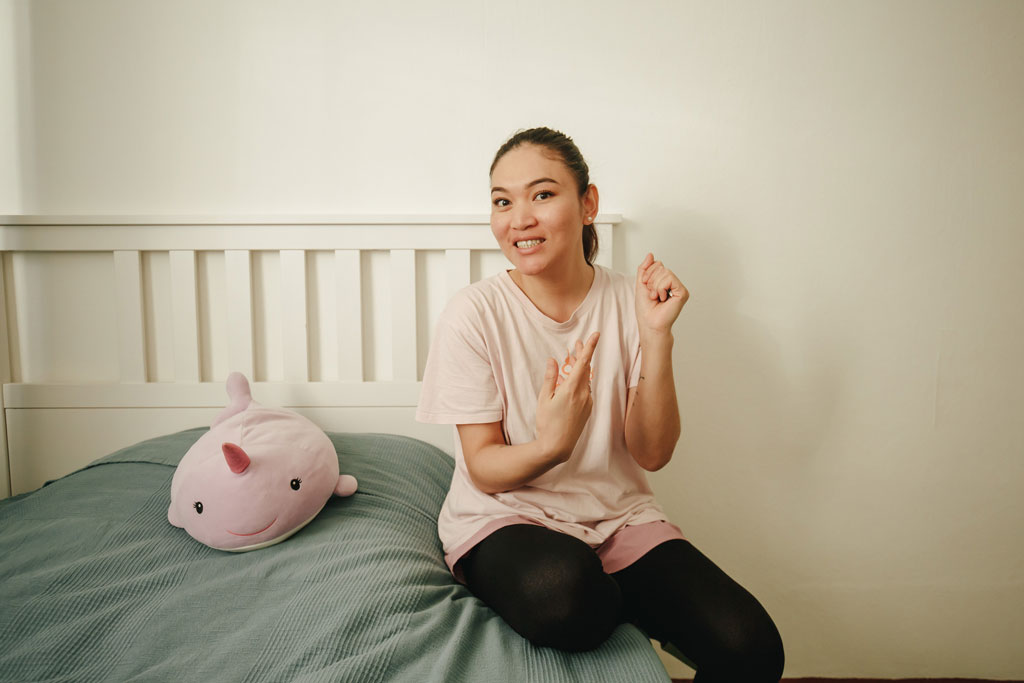
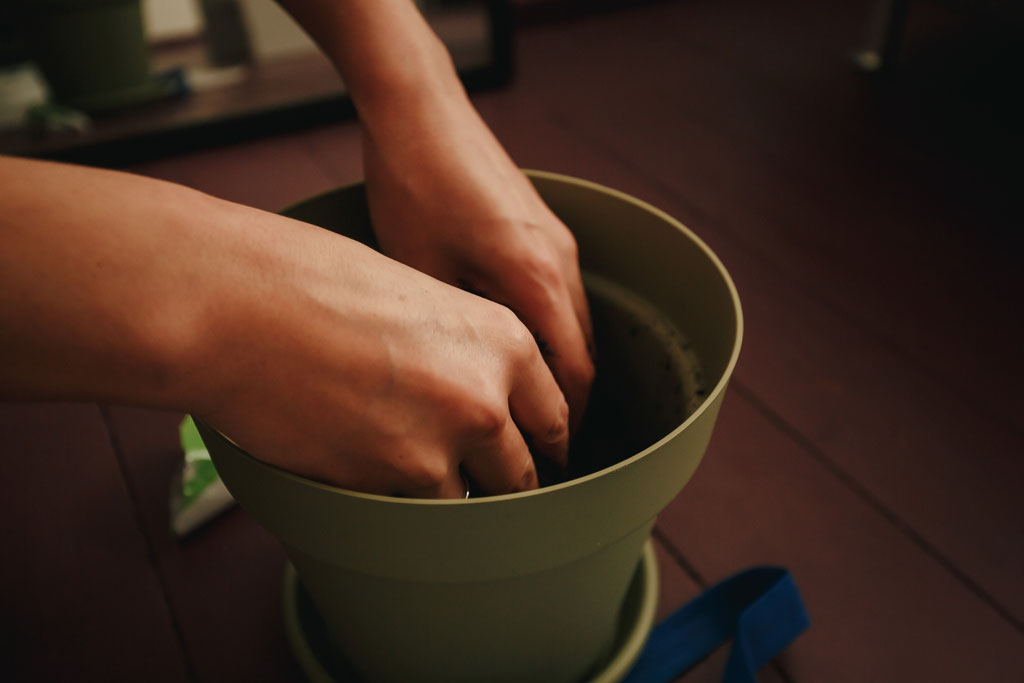
Gregory agrees with her: “If the dormitory project weren’t ending, I would gladly stay here. I feel good here because mentally I was completely exhausted after everything that happened. Here I find peace. For the first time in my life, I allowed myself to express my youthful ‘self’ — my entire wall is covered with posters of Natalia Oreiro!”
It was known in advance that the project would end at the end of March and that all residents would need to leave the building, so all the residents were constantly searching for their own housing. Not all of these searches were successful despite the existing support measures from the government and social services.
For example, Dmitro started looking for a flat just two months after living in the dormitory: “Finding a flat is very difficult because I searched for a long time without a WBS (housing certificate), where the competition is higher. I only attended nine viewings, and only once was I asked to provide documents. The rest of the time, I was just ignored. I tried different platforms, but without success.”
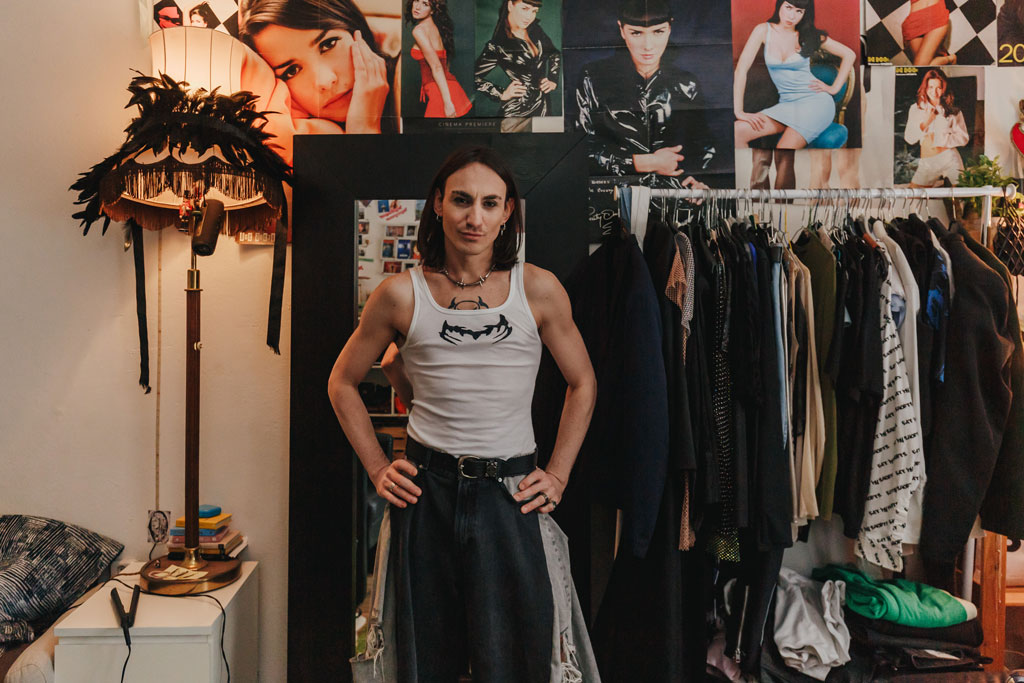
Some spent even more time searching for housing, encountering discrimination and prejudice in the process: “The search for a flat took a total of about eight months or longer. I started with a housing consultation at Quarteera, where an expert gave me advice on finding a flat. At the same time, I was gathering the necessary documents and searching on platforms like ImmoScout.
At first, I mainly focused on communal flats (WG). I was active in various Berlin groups where people were looking for roommates. Mostly, I communicated in English. When I responded to an ad, people would write back to me and show interest in renting me a room. But as soon as they found out that I was a refugee, they would either bluntly end the conversation or simply not respond anymore. At first, I didn’t understand why this was happening. Why did they stop responding? It all started so well! In the end, I found my flat through acquaintances. Unfortunately, all my attempts to find a flat through ’normal’ means were in vain,” says Kanikei.
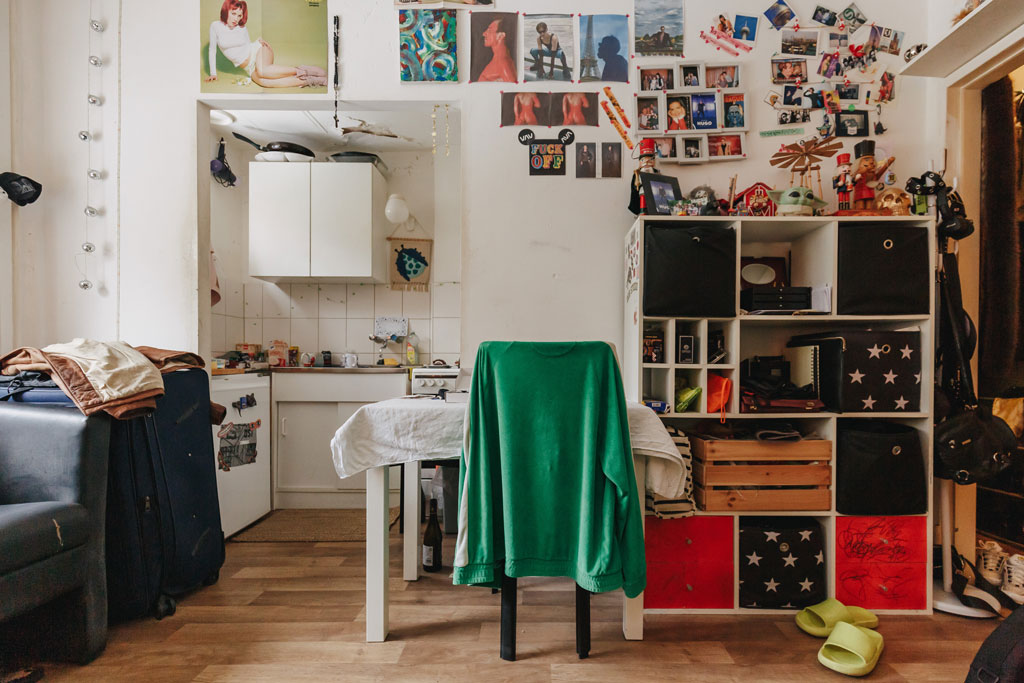
Many refugees genuinely don’t believe it’s possible to rent from the construction company as the competition is too high and demand far exceeds supply. Often, luck favours the most sociable and resourceful, as the search for housing turns into a real safari, where all means are fair. Like Gregory, for example:
“I was looking for listings on websites, but I had very few views — only two so far. It’s a lottery that I lost. I heavily rely on my network of contacts. I have quite a large circle of acquaintances. I have already stopped looking for an entire flat and am now looking for at least a room in a shared flat. How do I search for a flat?
Through communication and contacts. Perhaps, from the outside, I seem like a party-goer or a nightlife enthusiast, but that’s just a façade. When I go to a party or a club, it’s for a specific reason: to find a photographer, make connections, discover the creative community, and showcase my skills. Just like that, I’m also looking for a flat.”
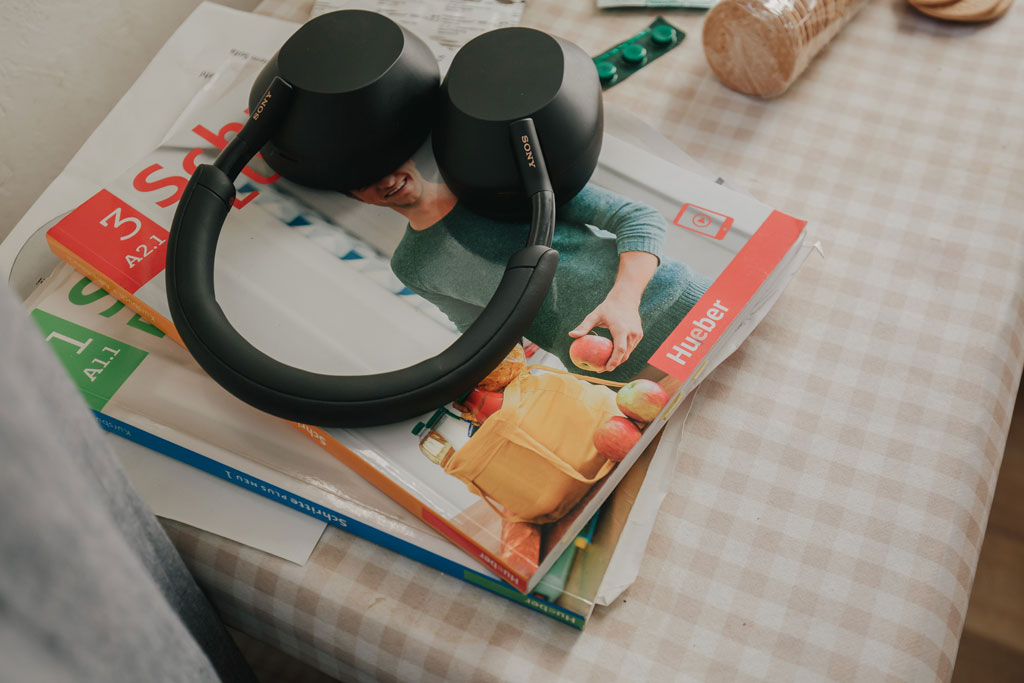
And although this time everyone managed to find another place to live thanks to the efforts of helping organisations and kind people, the housing issue remains highly relevant. Living in temporary dormitories and flats does not allow for relaxation and the building of one’s life and following one’s dreams.
We were curious about what our heroines and heroes dream of. Dmitro has far-reaching plans: “I really want to learn German and I dream of becoming a police officer. I know that it is a difficult and dangerous profession, especially in Berlin. I live in an area with a high crime rate, and I have already been attacked on the street. But I like Germany with all its flaws. Moreover, I want to take vocal lessons and one day represent Germany in the Eurovision Song Contest. The singer Nemo inspired me a lot in 2024. Now I’m a big fan of his and even bought a ticket to his concert — my first concert ever!”
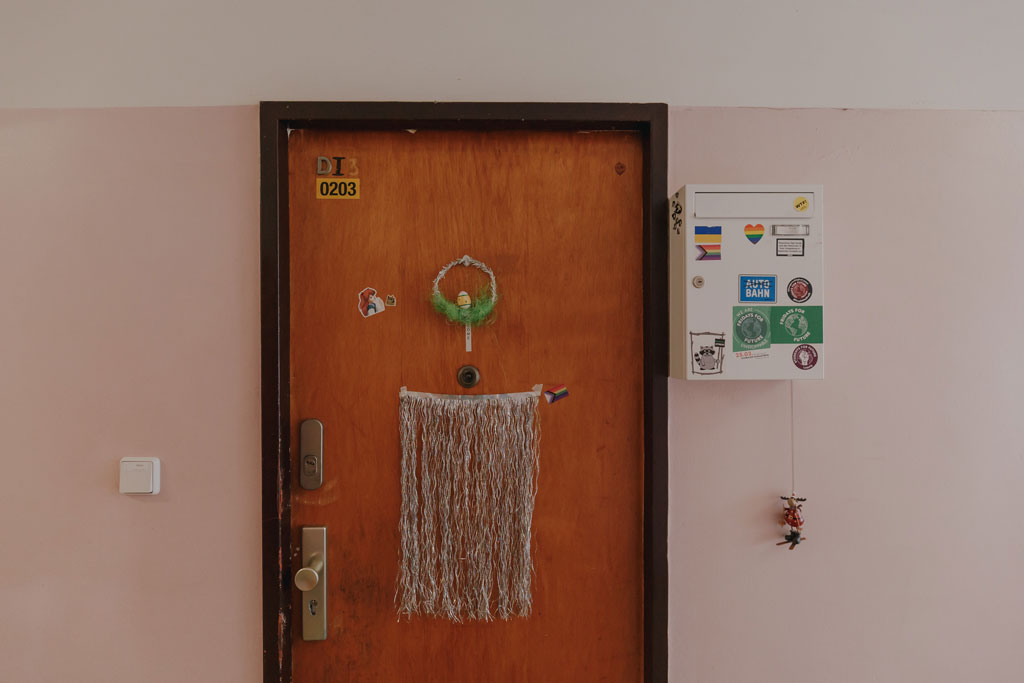
Same with Vlad: “I think when I finally manage to move into a normal flat with a permanent lease, I’ll be able to catch my breath and continue learning German. I would like to accept the job offer I have in my professional field and continue to develop further. My partner and I discuss this a lot, and neither of us sees our future in Berlin. Perhaps I will stay here until the end of 2025 to resolve my residency issues.
But still, you have to pretend that you will stay here for a long time. It’s hard to make long-term plans. The most important thing for me right now is to get out of depression. My psychiatrist and I have specific steps: improve my German to an acceptable level, find some work, and secure permanent housing. As soon as these three things come together, I will be able to stop taking medication. When you’re no longer just fighting for survival, you finally have the resources to build a real life.”
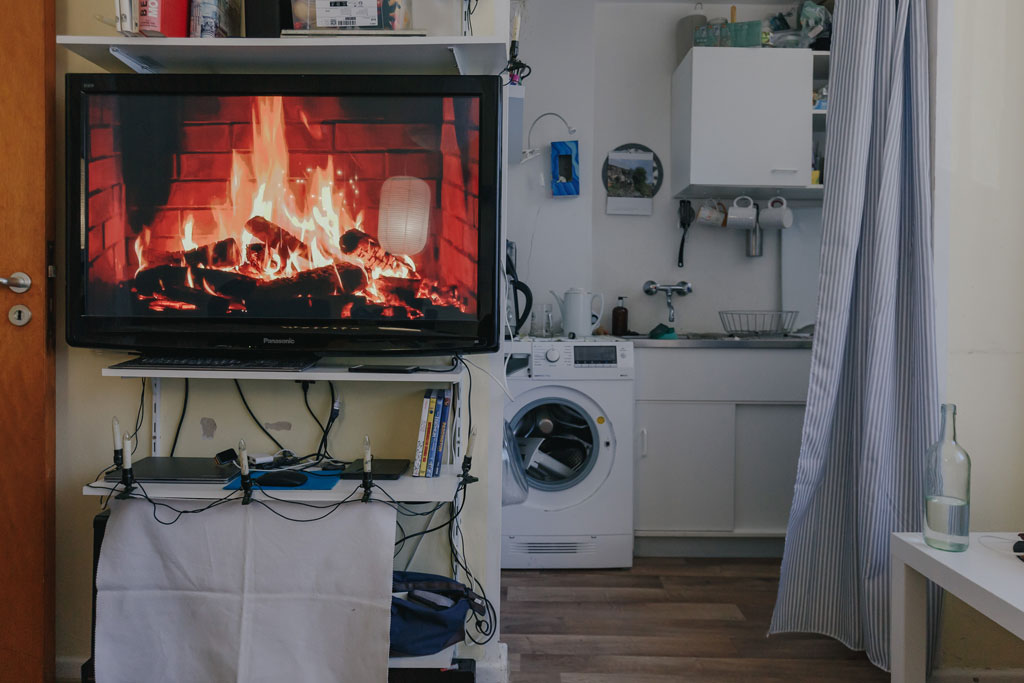
Some have more down-to-earth plans, like Gregory: “So, my plan for the next two years is simple: get a B1 certificate and find a permanent job in a hair salon. Everything else — working as an assistant, modelling, castings — brings in little money. In Berlin, everyone is beautiful and poor, and achieving success in this industry is very difficult.
But with my language skills, I might be able to work in the social sector as well — for example, doing haircuts for elderly people or people with disabilities for free. I’ve heard that such projects exist. And, to be honest, I adore Berlin grandmothers — I think we would get along great!”
As you can understand, all our heroines and heroes dream of their personal happiness and are ready to make every effort to achieve it. We really hope that their lives will drastically change for the better. All that’s left is to find their own little personal Eden.
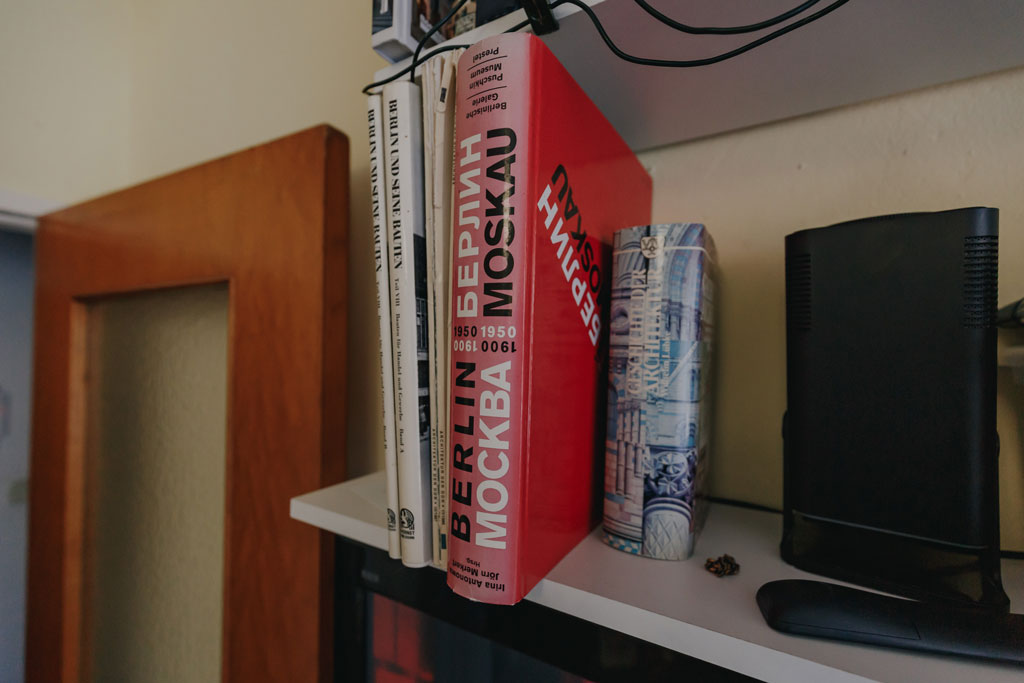
Photo Johannes Pøl